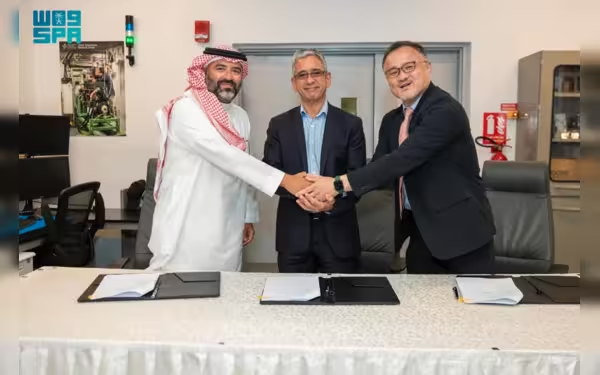Saturday, November 16, 2024 07:43 PM
KAUST Partners with Abdul Latif Jameel Motors and Toyota for Hydrogen Fuel Research
- KAUST acquires fuel cell modules from Toyota.
- Saudi Arabia aims for 2.9 million tons of hydrogen by 2030.
- Collaboration focuses on optimizing hydrogen fuel cells for local conditions.
 Image Credits: arabnewspk
Image Credits: arabnewspkKAUST collaborates with Abdul Latif Jameel Motors and Toyota to advance hydrogen fuel research in Saudi Arabia, aiming for sustainable energy solutions.
In recent years, the world has been increasingly focused on finding cleaner energy solutions to combat climate change and reduce greenhouse gas emissions. One of the promising avenues in this quest is hydrogen fuel technology, which has the potential to revolutionize the transportation sector. Saudi Arabia, a country known for its vast oil reserves, is now taking significant steps towards embracing hydrogen as a clean energy source. This shift is exemplified by a new partnership between the King Abdullah University of Science and Technology (KAUST), Abdul Latif Jameel Motors, and Toyota Motor Corporation.
The collaboration aims to enhance hydrogen fuel cell research, which is crucial for developing sustainable energy solutions. KAUST has taken a significant step by acquiring proton electrolyte membrane fuel cell modules from Toyota. This acquisition will enable KAUST to establish a state-of-the-art laboratory within its Clean Energy and Research Platform. The laboratory is expected to play a vital role in advancing hydrogen innovation in Saudi Arabia, particularly by adapting fuel cells to the unique environmental conditions of the region.
Saudi Arabia has set ambitious goals, aiming to produce approximately 2.9 million tons of hydrogen by 2030. This initiative not only seeks to provide competitive domestic and export costs but also aligns with the Kingdom's commitment to reducing greenhouse gas emissions and achieving net-zero emissions by 2060. The partnership between KAUST, Abdul Latif Jameel Motors, and Toyota is a significant step towards realizing these goals.
Professor Mani Sarathy from KAUST expressed enthusiasm about the collaboration, stating, "Through our Clean Energy Research Platform, we are focused on advancing research that will optimize hydrogen fuel cells for the region’s specific conditions, ensuring their efficiency and reliability." This statement underscores the commitment of all parties involved to innovate and develop sustainable solutions that will benefit not only Saudi Arabia but also the global community.
The research team at KAUST is currently exploring various aspects of PEM fuel cells, including their performance, durability, and environmental integration. This research is supported both technically and financially by Toyota Motor Corporation and Abdul Latif Jameel Motors, which has been the authorized distributor of Toyota vehicles in Saudi Arabia since 1955. The team is conducting a series of studies to evaluate factors such as temperature sensitivity and humidity effects, aiming to optimize the environmental benefits of these fuel cells within the Kingdom's infrastructure.
Mazin Ghazi Jameel, managing director of Toyota marketing operations at Abdul Latif Jameel Motors, emphasized the company's dedication to developing solutions that benefit local and global communities. He stated, "A key focus is promoting fuel cell technology to establish Saudi Arabia as a key contributor to sustainable mobility." This commitment reflects a broader vision of creating a cleaner, more efficient, and smarter transportation system that meets the needs of businesses and individuals alike.
Nobuyuki Takemura, chief representative of the Toyota liaison office for mobility and energy in Saudi Arabia, highlighted Toyota's long-standing commitment to environmentally friendly mobility solutions. He noted that the partnership with KAUST and Abdul Latif Jameel Motors is a significant step towards supporting Saudi Arabia's decarbonization goals and advancing the Kingdom's economic diversification in line with Vision 2030.
The partnership between KAUST, Abdul Latif Jameel Motors, and Toyota represents a significant leap forward in the pursuit of sustainable energy solutions in Saudi Arabia. As the Kingdom embraces hydrogen fuel technology, it not only positions itself as a leader in clean energy but also contributes to global efforts to combat climate change. This collaboration serves as a reminder that innovation and commitment to sustainability can pave the way for a greener future, benefiting both the local community and the world at large.













